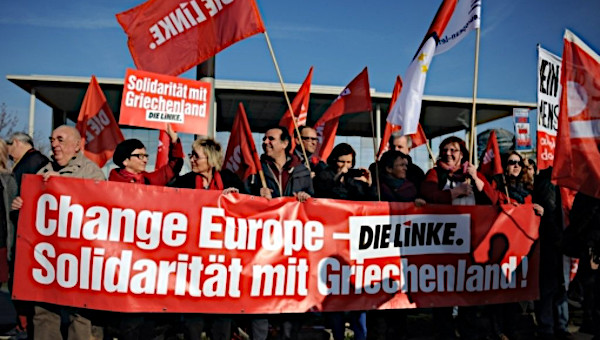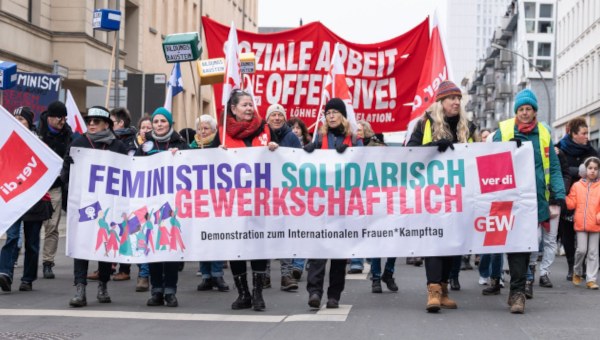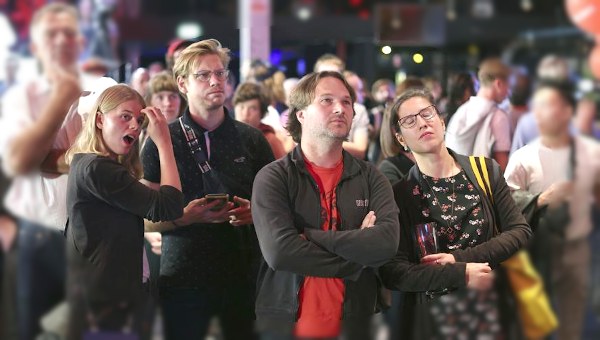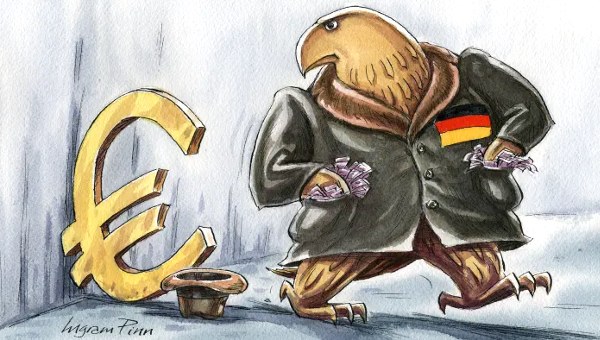Debating the Future of Die Linke: A Strong Die Linke Is Possible and Needed
When it was founded 15 years ago, on 16 June 2007, the German socialist party Die Linke inspired socialists and progressives across Europe as a chance to reunite and rebuild the Left in the European Union’s most populous and most powerful country. Today, however, the party finds itself in a deep crisis, with its electoral fortunes and, increasingly, its future existence as a nationwide political force on the line.
In order to facilitate strategic discussion and political clarification within the party, the Rosa Luxemburg Foundation, as Die Linke’s affiliated political foundation, established a Working Group on the Future of Die Linke to take a closer, empirically guided look at the party’s problems and potentials. Below is a shortened version of one of its first findings. You can find the full-length paper in German here.
The Working Group on the Future of Die Linke (Arbeitsgruppe Zukunft der Partei DIE LINKE) consists of Dagmar Enkelmann, Heinz Bierbaum, Michael Brie, Mario Candeias, Richard Detje, Sophie Dieckmann Heinz Hillebrandt, and Moritz Warnke.
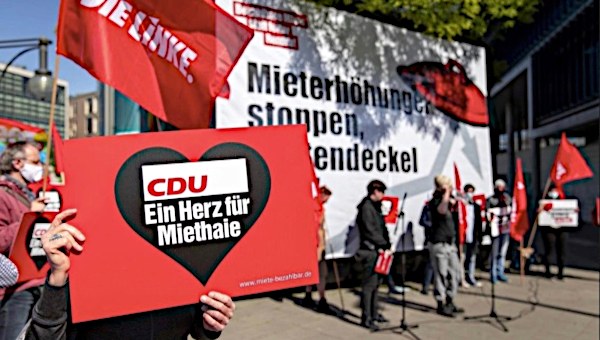
Ten Challenges to Rebuilding the Party as a Force for Democratic Socialism and Solidarity
The situation in which Die Linke finds itself is characterized by glaring contradictions: it has considerable potential to reach nearly one fifth of the electorate, and yet it receives fewer and fewer votes. Although Die Linke has gained 30,000 new, mostly young members over the last ten years, it is has not kept up with other parties. While its social campaigns garner widespread support, the party itself does not.
The people who need social protection the most and who value social justice above all do not regard Die Linke as a relevant point of reference or as representing them politically. Searching for alternatives to capitalism is important to one third of the population, but the socialist party Die Linke is not. Die Linke wants to be the left-wing party, but the positions it has adopted on all the major issues in recent years (migration, climate change, the coronavirus, the war in Ukraine) have been inconsistent and contradictory. These contradictions pose a challenge to the integrity and continued existence of the party. At the same time, as a force for solidarity in times of crisis and upheaval, Die Linke is urgently needed, but only if it can overcome the following ten challenges.
The first and most urgent challenge is without a doubt that of building a centralized strategic party leadership that unites the national party and its representatives in the German parliament, the Bundestag. The future of Die Linke depends on its completion of this task in 2022.
No new permanent entity was created after the Party of Democratic Socialism (PDS) and the Electoral Alternative for Labour and Social Justice (WASG) merged. The party is made up of three sub-projects: a left-wing social-democratic project (focused in the West), a left-wing movement that functions as a reference point for younger and more activism-oriented elements in the party, and the internally complex reformist camp (primarily in the East). These three sub-projects have thus far operated in an uncoordinated manner alongside and sometimes against one another. If the upcoming party congress does not prioritize establishing strategic unity, Die Linke will fail as a party.
Second, Die Linke needs to reflect on its core brand as a socialist justice party. The PDS, WASG, and Die Linke always excelled when they emphasized compelling positions on social justice issues. Some 96 percent of German citizens believe that wealth is not fairly distributed in Germany. Climate change is a social justice issue for the next generation, and 72 percent of the population wants to see radical change in this regard.
Social justice is a contemporary issue! But people lack confidence in Die Linke’s ability to take a practical approach to achieving social justice. Only three percent of the German population trusts Die Linke in matters of environmental and climate policy, only one percent with respect to economic policy, and two percent where digitalization is concerned. Die Linke is not perceived as the party of the future.
Third, under the current circumstances, Die Linke can only position itself as the party of socialist justice if it can distinguish itself as the party of systemic social-ecological change and the party invariably in favour of peace. We are living in the age of crisis capitalism and, increasingly, also of disaster and war capitalism. System change, not climate change presents an appropriate solution to our predicament. Ecological and social demands must be linked together, and the concept of a “just transition” captures both sides of that demand. Economic democracy is inseparable from social-ecological transformation.
All of this points toward the need for a fundamental change in the ways that economies, social systems, power, and property relations are regulated. It also points toward a new mode of production and living, one which would entail a systemic change that takes both peace and security policy into account. Die Linke should be a driving force in the creation of a new international security architecture under UN leadership, one that outlaws atomic, biological, and chemical weapons of mass destruction. Scaling back war and military conflict is a basic precondition for social-ecological transformation.
Fourth, it is urgently necessary to counter the current crises of capitalism with a combination of social protections, a plan for social transformation, and the implementation of a necessary system change. Die Linke will only become a practical and useful component of Germany’s political system when it can convincingly represent a position that brings these aspects together.
The desire for social security and an orientation toward the future go hand in hand. The demand for a comprehensive transformation of the prevailing modes of production and living needs to be combined with a concrete, credible promise of security. Without a commitment to security and a guarantee that the job market will be reliable, there can be no justice amidst the transformation.
Fifth, the foundation for any such combination of protection, planning, and systemic change must be built on a coalition in which the middle and working classes stand in solidarity. Like all left-wing organizations, Die Linke must confront the fact that capitalist competition divides classes of wage labourers: at the regional, national, European, and global levels, and along the lines of gender, identity, age, citizenship status, and skin colour.
Left-wing parties must foster links of solidarity between more privileged social groups with the vulnerable lower-middle class and those lower on the social ladder. That is the only way that popular initiatives and large left-wing parties can develop. It is precisely these groups, which should jointly form the basis of a left wing that is capable of taking meaningful action, that are, on the one hand, united by their class position (particularly with respect to demands for a just configuration of society) and, on the other hand, culturally divided. The more privileged sectors of society in particular should be responsible for establishing connections with those from the lower strata.
Sixth, Die Linke can only develop a coalition between the middle and working classes if it creates strong connections with the worlds of industrial labour, public utilities, and social services as well as with emancipatory social movements. In particular, it should focus on developing close relations with the unions, including those in the factories.
Die Linke took new steps in this direction when it established its Gewerkschaftsrat (Union Council) in 2022, which operates nationwide. Many young members of Die Linke have close connections with social and ecological movements, but few if any of them are connected with the unions. Change can only happen together.
Seventh, these commonalities can be used to generate concrete entry-level projects into social-ecological systemic change and for a new peace and security policy. In Germany, Die Linke is currently not perceived as a party that can reliably impact social-ecological transformation or shape European or peace policy. Initiatives that start from local or state governments do not resonate at the national level. One exception has been support for the Expropriate Deutsche Wohnen & Co. initiative in Berlin.
An effort should be made to work in close contact with unions, Friends of the Earth Germany (BUND), social welfare organizations, social movements, and citizens on solidarity-based alternatives to the green capitalist project and to turn those working relations into a unifying foundation for electoral programmes, local action, and parliamentary work. Die Linke needs to be operationally present and intervene in transformative processes that are already underway and help provide them with a political orientation.
With respect to core programmatic questions, corridors must be established through which left-wing positions can be advocated within the party. In the first place, this involves developing forward-looking orientations and, in the second place, taking a clear stance against positions that are entirely incompatible with Die Linke’s programme. At the same time, a year-long process should be initiated that will lead to overcoming the shortcomings in that programme.
Eighth, on this basis, there is also a challenge to become a vibrant, member-driven party again. The process of revisiting the party programme can help with this. Die Linke has had such a substantial change in membership since 2011 that it is no longer feasible to call it the same party. More than half of its approximately 60,000 members have joined since then. Most of those are between the ages of 20 and 40, while many older members have left the party or died. Those who came from the SED or from the SPD and left-wing groups in West Germany before 1990 are now a minority.
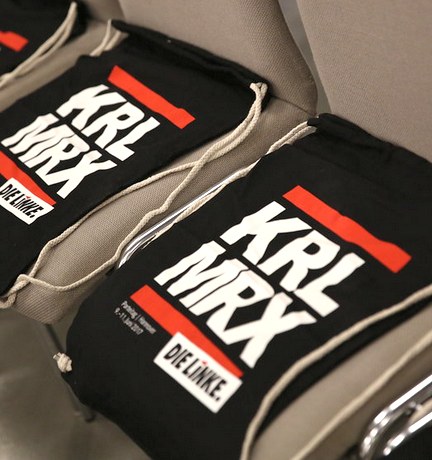
In order for the party to be appealing to society, it must earn a reputation as a solidarity-based, vibrant, member-driven party. Members want more unity, more debate among themselves, and more contact with the party on the ground. Anyone who finds their way to Die Linke must be received with open arms. This includes creating opportunities for party members to meet in a low-stakes environment to make decisions, engage in political debates, exchange experiences, work through conflicts in solidarity, have fun, and engage in inter-generational dialogue. Both basic political education and practical organizational skills need to be taught. An attractive, member-driven party must openly confront the fact that left-wing organizations are not immune to social structures of discrimination and domination.
The ninth challenge has to do with combining the three functions of a left-wing socialist party: a caretaker in everyday life, a force that intervenes in social discourse, and an effective parliamentary actor — in many communities, regions, and states. Left-wing parties are strong when they are able, first, to prove themselves as caretaker parties, directly demonstrating their use value in relation to the everyday concerns of people in communities and workplaces. Secondly, it is essential for them to intervene in public discourse, successfully set their party’s own agenda, and speak on behalf of popular social demands in state and national parliaments. Third, the party must work effectively in legislative and, in some cases, executive bodies.
At the same time, a change in the party’s statutes is needed so that plurality can be maintained and joint leadership of the national party and the parliamentary group in the Bundestag can finally be achieved, increasing the effectiveness of the party’s work and safeguarding democracy within the party.
Tenth, a socialist party needs a contemporary and new understanding of socialism. The experience of modern capitalism’s dramatic tendency toward crisis is making large portions of the population sceptical that a good life is possible for all under capitalism. Proposals for a social-ecological system change have an openly socialist character. The dominance of an orientation toward public welfare, the role of democratic planning and economic democracy, the expansion of an economy for the common good and reversing the privatization of many public services, earmarking private assets for future social tasks, the most comprehensive social safeguards possible in times of drastic structural change, the creation of transformation councils, global justice, etc. These elements and concepts can define socialism – also known as a society based on principles of solidarity.
Die Linke is urgently needed – but to meet that need, it must renew itself. •
This article first published on the Rosa Luxemburg Foundation website.


